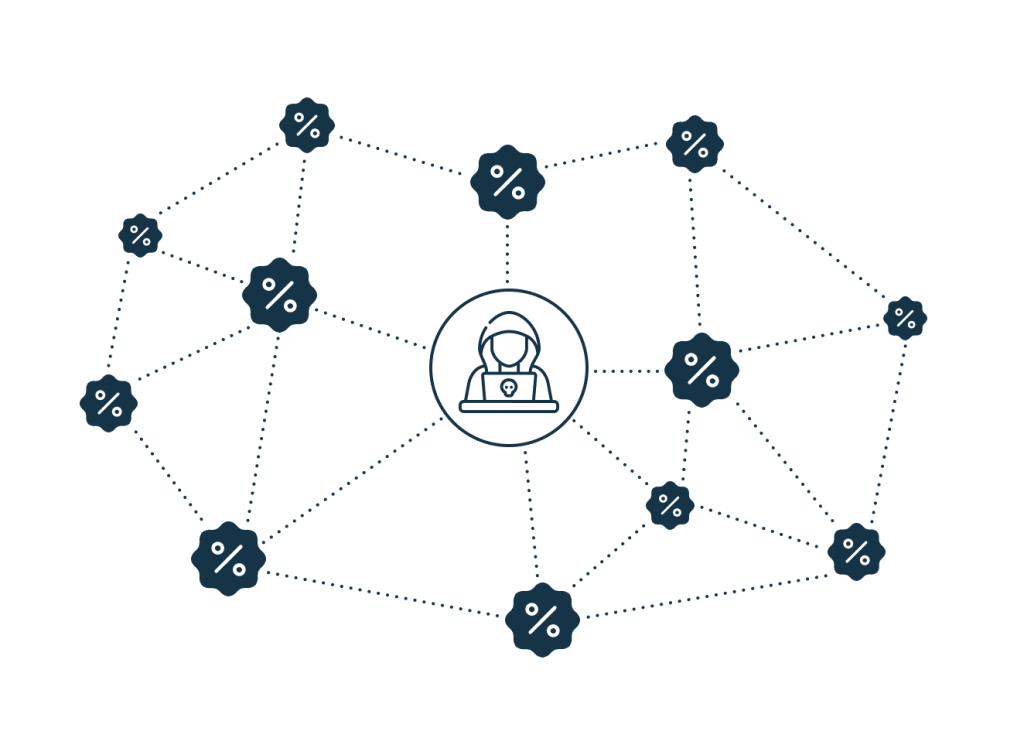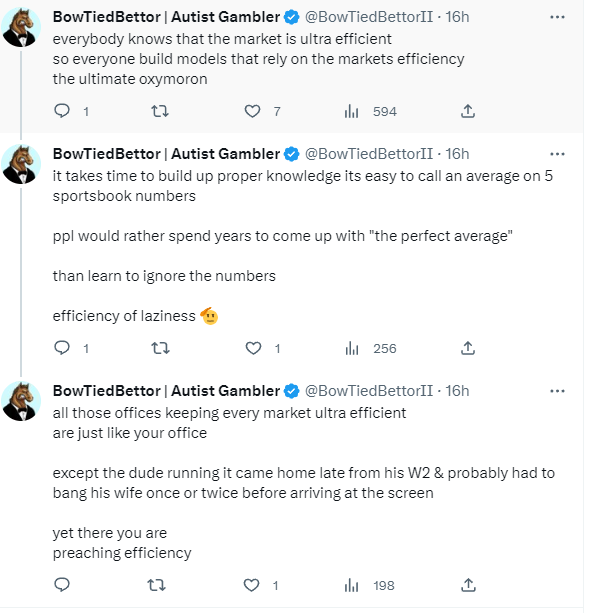Do you have a friend who likes betting and would like to sharpen his/her action? Help them on their path by sharing the BowTiedBettor Substack. Win and help win!
Welcome Degen Gambler!
It’s time for a post discussing the practical aspects of betting. Less theory, more day-to-day stuff.
As we’ve mentioned multiple times before, thinking doesn’t translate into profits. *Doing* does. No matter what kind of ingenious model/edge you’ve managed to develop, it won’t make you any money unless you keep showing up day after day for [at least] a couple of years. Thus, since this part of the game is guaranteed to take up such a great chunk of your time, why not optimize it?
In today’s post we’ll share a few things we’ve picked up along our path that relates to increasing the efficiency and profitability of a betting operation.
Note I: Some will truly believe that they can start tomorrow & “build a betting bot and let it print while spending time at the beach“. As delusional as it gets.
Note II: Real winners enjoy the infinite hammering & refinements of their edges. The Grind. Why? No doubt there’s a charm in it. For me personally there’s not much that beats a meeting where “I know everything about everything”. Completely prepared & in sync with what happens both at the racetrack and on the odds boards/in the pools. Magic.
Note III: One of our earlier posts, So you’re gonna be a bettor, huh?, is somewhat along the same lines and is a recommended read if you for some reason haven’t read it already.
Note IV: Since there are more or less an unlimited amount of things to say on this subject we’ll be back with a follow-up to this post in a few weeks. Will treat the practical parts of the Banking & Data segment of betting [unfortunately an important piece of the puzzle].
Structure of the post: a division into several subsections with each section containing a bunch of bullet points. Zero time wasted, tons of information.
Enjoy!
Limits
Limits [how much you’re allowed to bet] are a huge problem in betting. Some bookies offer fixed, equal limits for everyone, others (the marketing companies) decide the limits on a customer by customer basis. Profitable +EV bettors → kicked out as soon as possible. Casual punters with no clue/degenerate -EV enjoyooors → limits increased. Can discuss this for years but it is what it is.
The natural question to ask: how can I avoid being hindered by those limits? Several answers to this. If you insist on using sportsbooks, jump to the next bullet point. If not, betting exchanges [e.g. Betfair] or parimutuel betting [primarily available for horse racing] are possible solutions. However, no solutions without problems.
The ease of getting volume down attracts other sharps, i.e. makes the market more competitive & harder to beat.
Liquidity issues are common if you look beyond the most popular markets in the top leagues/games/meetings. On exchanges: significant spreads + no one willing to take the other side of your trades. In parimutuel pools: pool sizes too small to allow for appropriate sizing [your bets move the odds].
Multi Accounting is a popular technique to avoid limits/restrictions. You pay someone a fraction of the net profits/a lump sum to use their bookie/s account/s [win-win] & repeat this process ad infinitum. -EV accounts with high volume are optimal purchases, such accounts can be worth tons of money. Even new accounts can be made somewhat valuable if you artificially make them look -EV by placing a bunch of dummy bets before going full ‘tism.
Another plausible solution is Staking. Not staking in the sense of staking ETH lol. Instead: you’re a gambler with an edge in the NHL prop market. Meanwhile, your autist fren is an expert in the corners market for soccer games. Both of you are using a bookmaker that employs equal limits for everyone & both of you consider this limit [e.g. $ 500] too low. To avoid this problem you agree on sending all your bets to your gambling fren which places/stakes them on your behalf [effectively doubling your size]. As part of the deal you do the same when he finds something worth pursuing. Notes:
Be clever. There’s a reason for the limits being there in the first place and if you abuse them to a great extent there’s a risk of *all the accounts* being closed down due to ‘syndicate betting’. Don’t bet an outcome from multiple accounts at the same exact moment.
Requires trust between the people involved.
There are many versions/varieties of the deal described above. E.g. could be that your wanted size is $700 and so the guy places $200 on your behalf and keeps the other $300 of the bet for himself. Countless ways to come up with reasonable terms for the partnership.
Parlays can often be a clever trick to get more size down. In some cases it can be as simple as betting max limit on bet A, max limit on bet B, and finally combining them into a third bet, a double, to increase your stakes even more. In other cases: due to the nature of parlays [occasional, huge wins] bookies often allow higher max net profits from a parlay than they do for a single. For instance, let’s say that max return for singles are capped at $2K while it’s $10K for parlays. You have found a great bet at an odds of 4.00.
Alternative 1: Bet $500 at it.
Alternative 2: Pick a high RTP two-way market, say A: 1.96 - B: 1.96. Bet $1 275 on parlay A which is your 4.00 bet & outcome A, and $1 275 on parlay B [your 4.00 bet & outcome B]. Instead of $500 at 4.00 you now have $2 550 deployed at 3.92.
Alternative 3: Parlay it with a 1.01 outcome [what’s known as a ‘sure thing’ ;)] and bet ~$2.5K.
Information advantage
Betting is in large part an information game. If you’re a winning bettor you either:
Have access to better/more information.
Possess a stronger ability to learn from available information.
No matter which of it it is, getting the information streams set up correctly to strengthen your information advantage is crucial for a successful day-to-day operation.
Running automated sportsbook comparisons & therefore always knowing where to find the best prices without having to spend 15 minutes comparing them is extremely helpful. For main markets in top leagues there are more often than not tons of sites/services that help you do this, but for smaller/special markets you may need to build out the infrastructure yourself [lots of content on this here at BowTiedBettor]. Saves you time, earns you dollars. A necessity.
Receiving notifications when odds are released/limits are increased is another must-have. At odds release it’s *you against the bookie*. The bookie must put up a price for *all* outcomes. Meanwhile, all that’s required from you is to find *one* error. 20 minutes later a decent amount of gamblers have had a look at the offered odds already and almost surely corrected the most obvious mispricings [money you’re leaving at the table due to laziness & poor infrastructure].
& it’s of course much easier to beat *one counterparty* compared to a whole army of gamblers. Choose your battles wisely.
Again, have a look at our coding content and our Unibet scraper for inspiration on how to build this. If you don’t know how to do it yourself, hire someone to do it for you. Take action.
A third thing we do *all the time*. Observe the market action. What are other bettors doing? Where are prices moving? When did the moves take place? Why did they happen? Who’s behind the move? Did all the bookies react [appropriately] to the new information? Was the information even informative, or nothing but noise?
Setting up clever software systems to monitor the markets is an obvious way to get ahead. Common examples:
A horse drops from 10.00 to 7.50 over a span of 4 minutes. We have a second look at the horse and find that we’ve missed a change in equipment. Result: increased precision in our probability estimates.
30 minutes into our preparations for a specific race we have a clear picture of how a certain race will evolve. However, after taking a really deep dive into the race we discover something that turns our previous beliefs upside down. The premarket action may now serve as a proxy for how sharp the competition is for the given day.
In many cases the market sticks to the naive scenario, confirming that our competitors don’t *really* know what they’re doing. We understand what they’re doing but we don’t agree. An optimal situation.
In other cases we are confused by what’s happening → often a sign of us lagging [knowledge-wise] the bettors behind the moves.
Perhaps the most obvious reason: Use what’s happening at bookie/exchange A to beat bookie/exchange B.
Example: Scan the Betfair price action for UK horse racing and whenever you observe a price move that Bet365/Unibet etc. haven’t reacted to, bet the horse at those sites [you’re of course free to use any bookie and/or *arb* against the exchange if you prefer]. How can you do this? Well, we’ve already built it for you. Check out the BowTied BetPicks Website & join the Telegram Channel! Full launch later this summer. Stay toon’d!
Betting
General points on betting.
Understanding the price discovery process of the markets in which you’re operating is important. At the surface level it indeed seems like a difficult proposition to beat tens of independent bookies using their advanced AI/ML models to come up with perfect prices & identify hidden patterns in their customers’ action. Well, sounds cool, until you actually enter the markets. And see the reality. *One* bookie/exchange with a dozen of active sharps. The rest of them copy pasting this “source of truth”. It’s not you versus the masters you’re fearing. It’s you versus a confused dude at the bookie’s office [indeed must be confused if working at a sportsbook, even if we couldn’t beat them would never join them] and a couple of other gamblers that are more or less copies of yourself [sadly most likely read the same books → have the same ideas, yes that’s how boring we are].
Identify these “sources of truth”. Could be Betfair, could be Pinnacle, could be a local bookie allowing volume due to well developed systems for domestic leagues/games/races.
Identify the copy pasta machines, i.e. the bookies [marketing companies] that have given up already & simply reposts the prices observed at the price discovery bookie.
Learn what’s required to move prices at different places. Should you trust the price action at a bookie that moves an odds 20 % due to a $200 bet? A $2 000 bet?
If $700 is all that’s required to manipulate the “source of truth”-odds & get thousands of dollars down at other places, is the “source of truth” perhaps a “source of manipulation”? Think hard about such things & Plan Accordingly.
Would you include the opinions of/price action at a bookie whose sole profitability derives from restricting & banning sharp customers in your “averages”?
If the “source of truth” is a parimutuel pool then there’s not really much price discovery taking place until the very last minute. Zero incentives for a knowledgeable bettor to correct any mispricings prior to the last few ticks.
Odds/prices are not fixed through time. They are in constant motion until kick-off/post time. Yes, part of the job is the ability to answer whether the odds posted on a certain object is too high. A more sophisticated part of it is to further strengthen this ability by developing the skill to predict the future price path. Not the same thing.
If you’re interested in obtaining a given position you’d of course always prefer to maximize your average odds. Thus, even if what you observe right now is +EV, the correct decision may be to wait.
Exchanges allow you to trade in and out of your positions. If you’re good at predicting price movement this is an excellent opportunity to convert this knowledge into dollars. [& if you’re less of a trader but still find some of these obvious mispricings from time to time, load up a huge position and sell it at the exchange closer to kick-off. Can be hard to execute in practice due to limits/large transactions but once in a while it may make a ton of sense.]
The art of predicting price paths is not about advanced mathematics but rather about learning & understanding how other market participants are acting/what they’re valuing. Read what others are doing. As mentioned before there are situations where *I understand why a price is likely to move in a certain direction*, but don’t agree with the theory backing it up. The trade is +EV, keeping the position is not. CLV is not all there is to it, after all.
Who’s on the other side of your trade? Betting is an information game. In a bet/trade, there are two persons/entities involved & the person possessing the more precise probability estimates is destined to take the less sophisticated one out of business over the long term. Therefore: make sure not to be the NGMI-dude. More on this in a heavily autistic post coming up at the Substack.
An obvious one: keep a record of your bets. If you’re not running some kind of performance analytics once in a while you’re 100 % missing out on profits. All edges/angles can be refined/perfected. Log all your bets in a detailed manner in order to create a sufficient dataset that may provide an insight or two later on. Literally takes ~10 seconds to log a bet
*manually* so it being a ‘time consuming’ process is pure cope.Then use the theory in the below two posts to analyze & learn from the record.
Bet sequences, an analysis
Do you have a friend who likes betting and would like to sharpen his/her action? Help them on their path by sharing the BowTiedBettor Substack. Win and help win! Welcome Degen Gambler! Suppose that you’ve managed to develop a promising betting model. The basic backtests have been looking good and by now you believe the time has come to test it live. You’d however prefer to have gained some insight regarding the sequence of bets that you and your model are about to generate prior to launching it. Questions such as the following arise:
Bayesian thinking & inference, part 2
Do you have a friend who likes betting and would like to sharpen his/her action? Help them on their path by sharing the BowTiedBettor Substack. Win and help win! Welcome Degen Gambler! Bayes Craze! It’s time for the second part of our Bayesian series, a series which aims to introduce you to the world of Bayesian learning & put you in a Bayesian state of mind, or dare we say, a correct state of mind.
The Ultimate Setup
A combination of the above ideas together with a fair bit of Banking/Data [the relationship between a bettor and his bank, KYC, Source of Wealth & Affordability Checks, data collection, data storage, data analysis and so on… [coming up at the Substack]] magic yields The Ultimate Betting Setup. And, as you might have noticed, there’s a reason we call it a betting *operation*. This is not something you get done by spending 1-2 hours a week for a short period of time after falling victim to a random ‘betting is cool’ thought.
& we’re of course *not* saying this is something the average reader should get to work on, though we hope he/she may have found the read interesting anyway.
If you’re one of the serious ones, a great deal of the information you need is now out there. “The rest is up to you”.
Until next time…
Disclaimer: None of this is to be deemed legal or financial advice of any kind. These are *opinions* written by an anonymous group of mathematicians who moved into betting.












